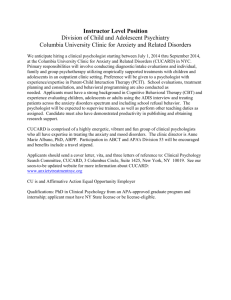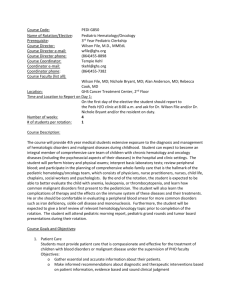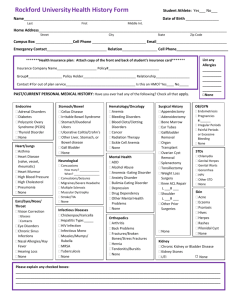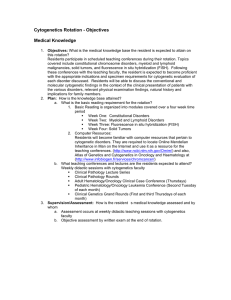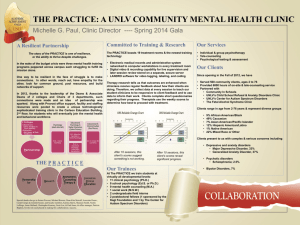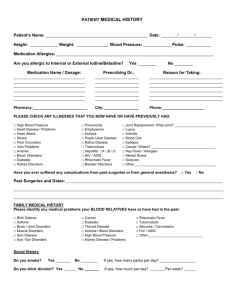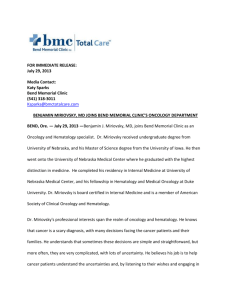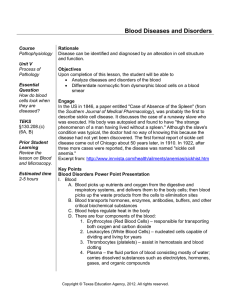Course: Hematology/Oncology Ped 1202
advertisement
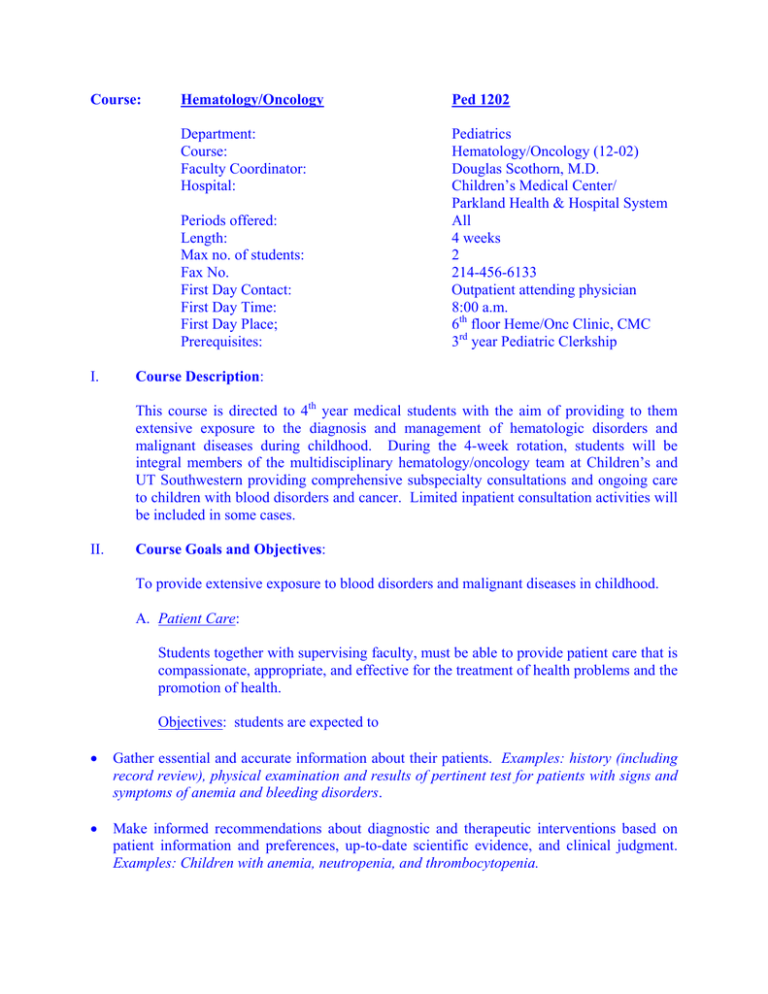
Course: Hematology/Oncology Ped 1202 Department: Course: Faculty Coordinator: Hospital: Pediatrics Hematology/Oncology (12-02) Douglas Scothorn, M.D. Children’s Medical Center/ Parkland Health & Hospital System All 4 weeks 2 214-456-6133 Outpatient attending physician 8:00 a.m. 6th floor Heme/Onc Clinic, CMC 3rd year Pediatric Clerkship Periods offered: Length: Max no. of students: Fax No. First Day Contact: First Day Time: First Day Place; Prerequisites: I. Course Description: This course is directed to 4th year medical students with the aim of providing to them extensive exposure to the diagnosis and management of hematologic disorders and malignant diseases during childhood. During the 4-week rotation, students will be integral members of the multidisciplinary hematology/oncology team at Children’s and UT Southwestern providing comprehensive subspecialty consultations and ongoing care to children with blood disorders and cancer. Limited inpatient consultation activities will be included in some cases. II. Course Goals and Objectives: To provide extensive exposure to blood disorders and malignant diseases in childhood. A. Patient Care: Students together with supervising faculty, must be able to provide patient care that is compassionate, appropriate, and effective for the treatment of health problems and the promotion of health. Objectives: students are expected to • Gather essential and accurate information about their patients. Examples: history (including record review), physical examination and results of pertinent test for patients with signs and symptoms of anemia and bleeding disorders. • Make informed recommendations about diagnostic and therapeutic interventions based on patient information and preferences, up-to-date scientific evidence, and clinical judgment. Examples: Children with anemia, neutropenia, and thrombocytopenia. • Counsel and educate patients and their families. Examples: Risks of excessive cow milk ingestion, avoidance of antiplatelet agents with children with bleeding disorders. • Provide health care services aimed at preventing health problems or maintaining health. Examples: penicillin to prevent pneumococcal septicemia. • Work with health care professionals, including those from other disciplines, to provide patient-focused care, develop and carry out patient management plans. Example: Dietary consultation for infants with iron deficiency anemia, pharmacy and nursing consultations for receiving cancer chemotherapy. • Use information technology to support patient care decisions and patient education. Example: provide parents with pamphlets and information on how to access web sites pertaining to their child’s disease. B. Medical Knowledge Students must demonstrate knowledge about established biomedical and clinical sciences and the application of this knowledge to patient care. Objectives: Students are expected to • Demonstrate an analytic thinking approach to clinical situations. Examples: recognize different causes of thrombocytopenia and provide a list of more likely and less likely causes; recognize risk factors that predict the prognoses of a child with leukemia. • Know and apply the basic and clinically supportive sciences that are appropriate to their discipline. Examples: etiology of neutropenia, mechanisms of drug-induced and hereditary neutropenia, inheritance of and screening for hemoglobin opathies. C. Practice-Based Learning and Improvement: Students must be able to assimilate scientific evidence and improve their patient care practices. Objectives: Students are expected to • Locate and assimilate evidence from scientific studies related to their patients’ health problems. Example: randomized controlled trials of therapy for leukemia and sickle cell disease. • Use information technology to manage information, access on-line medical information, and support their own education. Example: use Medline to provide summary of current protocols for treating Ewing sarcoma. D. Interpersonal and Communications Skills Students must be able to demonstrate interpersonal and communication skills that result in effective information exchange and teaming with patients and their families. Objectives: Students are expected to • Use effective listening skills and elicit and provide information using effective nonverbal, explanatory, questioning, and writing skills. Example: educating parents of children with sickle cell disease regarding the use of prophylactic penicillin and risks of pneumococcal septicemia; providing appropriate information regarding diet in infant with iron deficiency anemia. • Work effectively with others as a member of a health care team. E. Professionalism Students must demonstrate a commitment to carrying out professional responsibilities, adherence to ethical principles, and sensitivity to a diverse patient population. Objective: Students are expected to • Demonstrate respect, compassion, and integrity; a responsiveness to the needs of patients that supersedes self-interest; accountability to patients and the profession; and a commitment to excellence and on-going professional development. Example: willingness to seek additional patients for evaluation. • Demonstrate a commitment to ethical principles pertaining to provision or withholding of clinical care and confidentiality of patient information. • Demonstrate sensitivity and responsiveness to patients’ culture, age, gender, and disabilities. III. Method of Instruction: A) Didactic • • • • Weekly research conferences (Tuesdays, 8:15 am – 9:00 am). Weekly Tumor Boards (Tuesdays, 4:30 pm - 5:30 pm). Weekly fellow’s educational conferences (Wednesdays, 7:15 am - 8:00 am) Weekly Pediatric Grand Rounds (Wednesdays, 8:15 am – 9:00 am) B) Clinical Students attend outpatient clinic each day and participate in multidisciplinary clinic review conferences, team meetings, and evaluation of new and return patients with hematologic and malignant disorders. This involves regular one on one contact with faculty as well as interactions with fellows, residents, advanced practiced nurses, and nursing staff. Regular review sessions of peripheral blood and bone marrow specimens accompany these evaluations. The students will also be expected to attend the twice-weekly conferences (on Mondays and Fridays at 8:00 am) which involve multidisciplinary discussions of problem cases. Students also have opportunity to attend various subspecialty team rounds and clinical sessions dealing with stem cell transplantation (Wednesday afternoons), hemophilia (Thursday mornings), sickle cell disease (Thursday afternoons), and the neuro-oncology (Thursday mornings). C) Student responsibilities (and to whom accountable) Evaluate new and return patients and present them to and discuss them with the attending physicians and other clinic personnel. The student is responsible to the attending physician (in clinic each day). IV. Method of Evaluation of Students: Pass-Fail Grades: There are no examinations. Completion of an online evaluation by the student is required for a pass grade. Evaluations of the student by the faculty will be based on achievement of the stated objectives of the course. Similarly, evaluations of the elective (by the students) will include whether the student considers that the stated objectives of the course were achieved.
